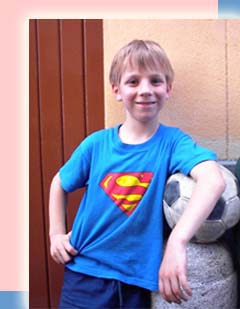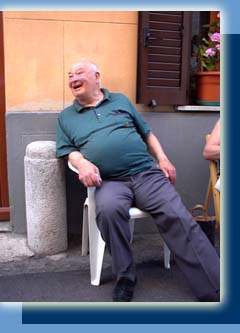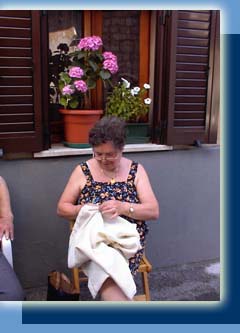 During his free time, young resident Matteo Catena plays soccer in the quiet,
safe streets of Cagli
During his free time, young resident Matteo Catena plays soccer in the quiet,
safe streets of Cagli |
 The elder patrons of Cagli watch the sun travel across the piazza while teenaged vespa-riders chain-smoke Camels on the benches at Café del Teatro. The older folks have grown up, worked, and raised a family here. They wander around town, content to know that everyone on the street is a neighbor, friend, relative, or some combination of the three. The elder patrons of Cagli watch the sun travel across the piazza while teenaged vespa-riders chain-smoke Camels on the benches at Café del Teatro. The older folks have grown up, worked, and raised a family here. They wander around town, content to know that everyone on the street is a neighbor, friend, relative, or some combination of the three.
 The adolescents also have spent the better part of their lives here as well. Many of them are surrounded by their extended families, as well as every friend they have ever known. Some have never been to Rome, a mere three-hour trip to the south. It seems not much has changed over two or three generations of Cagliesi. The adolescents also have spent the better part of their lives here as well. Many of them are surrounded by their extended families, as well as every friend they have ever known. Some have never been to Rome, a mere three-hour trip to the south. It seems not much has changed over two or three generations of Cagliesi.
|

|
 But in the air is
the scent of more than second-hand smoke. Speedy vespas line the weathered
old boulevards. Cell phones beep on the belt of anybody under age fifty.
Teenage faces appear bored. But in the air is
the scent of more than second-hand smoke. Speedy vespas line the weathered
old boulevards. Cell phones beep on the belt of anybody under age fifty.
Teenage faces appear bored.
 Cagli is becoming
increasingly modern under its ancient, weathered façade, but things aren't
changing fast enough for the Cagli youth. Those on the verge of higher education,
inheriting family businesses, and making their mark on the world are running
out of reasons to stay. In an effort to keep an entire generation of future
residents from leaving, Cagli may risk losing the small town charms and
family closeness that has defined the town for so many years. Cagli is becoming
increasingly modern under its ancient, weathered façade, but things aren't
changing fast enough for the Cagli youth. Those on the verge of higher education,
inheriting family businesses, and making their mark on the world are running
out of reasons to stay. In an effort to keep an entire generation of future
residents from leaving, Cagli may risk losing the small town charms and
family closeness that has defined the town for so many years.
 With steely, wise,
old eyes keeping guard over shady via Giuseppe Verdi, two couples of forty-two
years barely allow the speedy Fiats enough room to squeeze by. Assunta Martinelli,
Piero Giovanotti, and Mariano Luchini discuss the heat, local gossip and,
more importantly, the afternoon's infamous soccer game; Italy lost to Germany
2-1 in the World Cup Semi-Finals. Egiziana Bettini, working alongside her
lounging companions, sews a tablecloth and throws her two euro into the
conversation now and again. They keep a joint eye on Matteo Catena, Assunta's
grandnephew, who, wearing a blinding blue Superman shirt, dribbles a soccer
ball up and down the empty street. Assunta and Mariano, as well as Egiziana
and Piero have been married for 42 years. Their entire families, except
for a few stray descendants studying at university, live in Cagli. Aside
from tours of military service and the occasional move to and from other
nearby small towns, the four shiny-eyed veterans have spent most of their
lives in Cagli. With steely, wise,
old eyes keeping guard over shady via Giuseppe Verdi, two couples of forty-two
years barely allow the speedy Fiats enough room to squeeze by. Assunta Martinelli,
Piero Giovanotti, and Mariano Luchini discuss the heat, local gossip and,
more importantly, the afternoon's infamous soccer game; Italy lost to Germany
2-1 in the World Cup Semi-Finals. Egiziana Bettini, working alongside her
lounging companions, sews a tablecloth and throws her two euro into the
conversation now and again. They keep a joint eye on Matteo Catena, Assunta's
grandnephew, who, wearing a blinding blue Superman shirt, dribbles a soccer
ball up and down the empty street. Assunta and Mariano, as well as Egiziana
and Piero have been married for 42 years. Their entire families, except
for a few stray descendants studying at university, live in Cagli. Aside
from tours of military service and the occasional move to and from other
nearby small towns, the four shiny-eyed veterans have spent most of their
lives in Cagli.
"The main change is that many years ago Cagli was reserved for people who lived here,"
says Egiziana, "there were not as many foreigners. It's also less quiet."
 She blames the
noise on the tourists and rambunctious students. A slightly wicked smile
grows as she accuses Loyola students of playing their part. Mariano believes
the economy is very healthy. Assunta concurs; the Italian tourists visiting
Cagli are wealthier, owning two or three houses. She blames the
noise on the tourists and rambunctious students. A slightly wicked smile
grows as she accuses Loyola students of playing their part. Mariano believes
the economy is very healthy. Assunta concurs; the Italian tourists visiting
Cagli are wealthier, owning two or three houses.
Click
to continue... |
 Mariano Luchini laughs while he recollects memories of his time in Cagli
Mariano Luchini laughs while he recollects memories of his time in Cagli
 Egiziana Bettini, a resident of Cagli, knits a tablecloth while speaking
of the changes that have taken place in her city
Egiziana Bettini, a resident of Cagli, knits a tablecloth while speaking
of the changes that have taken place in her city |

 During his free time, young resident Matteo Catena plays soccer in the quiet,
safe streets of Cagli
During his free time, young resident Matteo Catena plays soccer in the quiet,
safe streets of Cagli 
 Mariano Luchini laughs while he recollects memories of his time in Cagli
Mariano Luchini laughs while he recollects memories of his time in Cagli
 Egiziana Bettini, a resident of Cagli, knits a tablecloth while speaking
of the changes that have taken place in her city
Egiziana Bettini, a resident of Cagli, knits a tablecloth while speaking
of the changes that have taken place in her city 